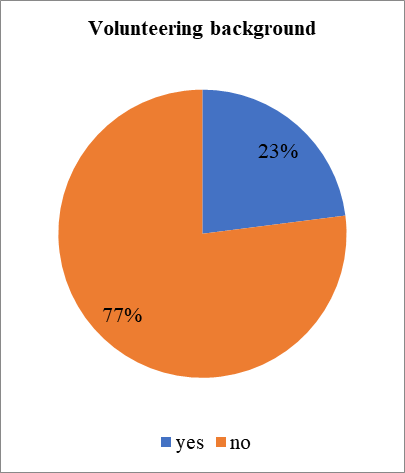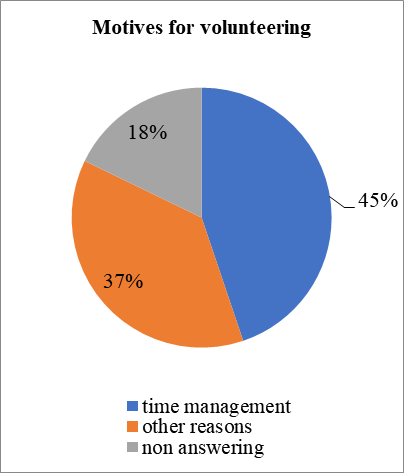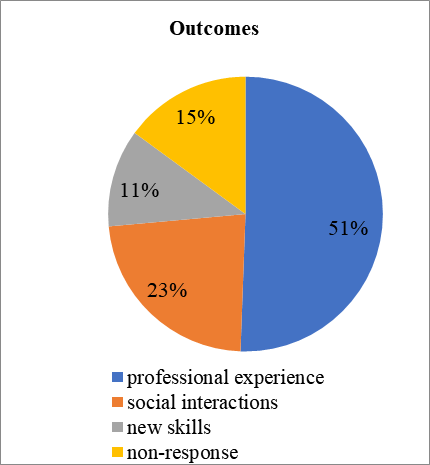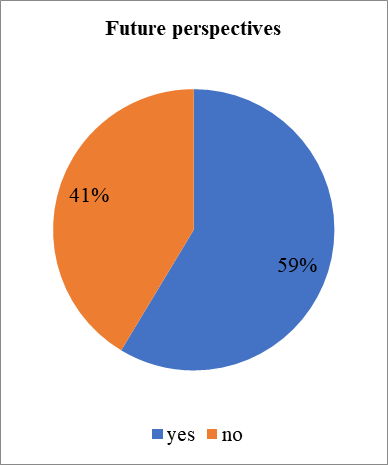Abstract
Volunteer work has different implications on the development of certain professional skills based on the link between knowledge and the skills related to them, on social responsibility and involvement. Being a volunteer creates a great advantage in applying for a job, is a proof of empathy, unconditional social support, mutual help and a pathway to the benefit of society. The aim of this study is to better understand the UNEFS (National University of Physical Education and Sports) students’ opinions regarding volunteer work as professional training during their university program. The methods used were: the bibliographic study, the questionnaire survey and statistics. The research took place at UNEFS, during February and March 2018. We questioned 174 students from the Faculty of Physical Education and Sports and the Faculty of Kinetotherapy. These students participated in a study on motivation for volunteer work and other extracurricular activities. The results of the study have led to the conclusion that the students’ interest and motivation are poor and their involvement in volunteer work and extracurricular activities is quite limited. This situation can be understood as a result of the students’ lack of perspective upon their professional skill development, personal development and social involvement through volunteer work.
Keywords: Motivationvolunteer workstudentssocial responsibility
Introduction
Volunteer work represents an altruistic involvement of a person in different activities with various tasks as: organizing, conducting, managing, coordinating and assessing during the social services for communities. These kinds of activities are not paid by definition, but there are ways that can bring satisfaction to the workers involved in the activity. Among the main benefits of volunteer work, we mention: gaining work experience, confidence, developing new professional and social skills, feeling part of a team and a community, making a change in the social environment.
Even if the benefits of volunteer work are well-known, young students do not always find the internal resources for participating in social activities and supporting different services for the community.
The causes behind the limited involvement of students in society might be linked to their culture, education, social and economic background, life experience, friends and family habits. The European Commission emphasises that people face difficulties in reaching information about the application process for volunteering (European Commission, 2010). Besides these factors, student motivation is a strong process that needs to be better understood in order to generate lifelong believes and arguments for being an active part of their own community. Different topics that are considered as worldwide priorities can raise the interest of young students starting from helping their peers, supporting different disadvantaged groups of population up to saving animals, protecting nature and global resources, fighting for the human rights and against discrimination etc. Depending on each particular personality and social and professional environment, each person can find a right cause to fight for and launch into the proper volunteer activity.
Problem Statement
Overview of volunteer work worldwide
In the last two decades, it could be noticed an increasing interest in understanding the concept of volunteering and some problem statements were made by policy makers. The European Volunteer Centre explains volunteering as an activity developed in formal and informal settings for shorter or longer periods of time, as well as in different fields. In Europe, each member state promotes a particular perspective in defining the concept of volunteering. The International Federation of Red Cross and Red Crescent Societies, the Inter-Parliamentary Union and United Nations Volunteers underline that there are no global models for the concept of volunteering (Niskala, Johnson, & De Raad, 2004).
In Romania, the Law on Volunteering was adopted at the beginning of 2000 and then amended in 2016. According to this document, volunteering is understood as an activity meant to help the others by free will and with no financial remuneration, based on a legal contract between the organization and the volunteer (Legea 175/2016).
Statistics emphasise that, in the US, there are 62.6 million people that volunteered at least once during one year (US Bureau of Labor Statistics, 2016). Over the years, statistics show a stable number of about 25% participants in volunteer activities. What is particular in the US is the number of people engaged in volunteer work at any given time, which represents 50% of Americans (Hodgkinson & Weitzman, 1992; Sundeen, 1992; Van Villingen, 2000). So, it can be noticed the large involvement of the American society in charity work, volunteering or community services.
In Europe, evidence shows an increasing trend in the number of volunteers in the Member States. For example, countries like Austria, Belgium, Denmark, France, Greece and Czech Republic have a high rate in the societal involvement; Estonia, Finland, Germany and Romania have a moderate rate, while countries like Slovenia (Van Hal, Meijs, & Stinbergen, 2004, p. 224) have recorded a decrease in volunteering.
Furthermore, the data about the gender balance of volunteers in the EU show a higher number of male volunteers in Austria, Belgium, Denmark, France and Germany, and a higher number of female volunteers in Bulgaria, Malta, Slovakia and the UK. Among all these countries, Romania, Cyprus, Estonia and Finland have a balanced number of female and male volunteers (European Commission, 2010, p. 69). Romania reports 12.8% volunteers in the adult population, with an increase in the number of elderly volunteer population (20%). On the other hand, in Romania, there are young volunteers aged 15 to 35 years representing 65% of the total number of volunteers (Năstase, 2016).
Benefits and needs in volunteer work
Volunteer work at different ages has positive outcomes. For elderly people, the main benefits are related to keeping them active and improving their health status (Anderson et al., 2014), and for young people, the benefits are linked to the development of productive and citizen behaviours (Morrow-Howell, Lee, McCrary, & McBride, 2014).
Young people participate in volunteer work as a form of civic engagement and specific activism, depending on their interpersonal orientation and antecedents of volunteering (Omoto, Snyder, & Hackett, 2010).
Researchers prove that volunteering in healthcare and social services can be regarded in a civic humanitarian paradigm based on emotional altruism (Krizova, 2012).
Some specialists studied the tribal communities and took into consideration the close relationships between their members. Junger (2016), in his book
The benefits of volunteering are associated with well-being, the improvement of social interactions (Bell et al., 2008; O’Brien, Townsend, & Ebden, 2010), personal satisfaction and feelings of joy by helping others, a decrease in the negative effects of professional loads and the fight against daily stress (Guiney & Oberhauser, 2009).
Society encourages young people to get involved in volunteering activities no matter their level of education, professional status or health limitations. Lindsay (2016) highlights the benefits and challenges of volunteering among young people with disabilities, who are willing and capable to bring their contribution to the needs of society and to break down social barriers.
Researchers try to identify the benefits and outcomes of volunteer work. These benefits are related to the internal motives of the individuals, as they are understood and explained by Maslow (1970). Starting from the main categories distinguished in the well-known hierarchy of needs, we consider that volunteering activity can contribute to the satisfaction of psychological needs and self-fulfilment needs. Outcomes as the feeling of joy, emotional altruism, social interactions and being part of a group are included in the needs for belongingness and love. Moving from there to the top, we take into account the needs for esteem, such as increasing self-esteem, helping others, the feeling of accomplishment in interpersonal relationships and the professional level. One of the most important benefits is linked to the self-fulfilment level, where we can identify the presence of the meaning of life, life satisfaction and significance of each own existence.
Each person can find him/herself in the process of self-development and the fulfilment of his/her own needs during volunteer work. Thus, each human being can build a powerful pathway based on the particular structure of their needs and internal motivation for their professional and personal becoming.
Research Questions
How often do young students from UNEFS get involved in volunteering? What are the main reasons of their involvement in the volunteering programs implemented by the university?
Purpose of the Study
The aim of this study is to emphasise the level of UNEFS students’ involvement in volunteering activities during their academic programs. This approach is based on a better understanding of young students’ opinions regarding volunteer work as professional training and life experience.
Research Methods
The methods used were: the bibliographic study, the questionnaire survey and statistics. The research took place at UNEFS, during February and March 2018. We questioned 86 1st year students from the Faculty of Physical Education and Sports, 39 1st year students from the Faculty of Kinetotherapy and 48 2nd year students from the Faculty of Physical Education and Sports. The subjects are aged between 19 and 21 years, 55 females and 119 males. The questionnaire was designed within the University Counselling Centre and was structured on four main investigation areas: volunteer work background, motives for the activities, outcomes generated by volunteering programs and future perspectives for getting involved in volunteering.
Findings
As a result of the questionnaire survey, we reveal the information corresponding to the items for the main directions addressed in this study.


According to Figure
For understanding their reluctance to get involved in volunteering, the responses were divided into three categories: “lack of time”, “other reasons” and “non-response” (Figure


Figure
Regarding alternative educational programs based on volunteer work and experience, 59% of students recognise that there are academic opportunities for volunteering during their studies (Figure
Conclusion
The results of the study have led to the conclusion that the students’ interest and motivation are poor and their involvement in volunteer work and extracurricular activities is quite limited. This situation can be understood as a result of the students’ lack of perspective upon their professional skill development, personal development and social involvement through volunteer work.
The subjects of our study identify the motives behind their involvement in volunteering and thus they place themselves at the middle of the Pyramid of needs as regards the belongingness and love levels, according to Maslow (1970). Their emotional needs are related to their emotional development as young adults and young professionals, in their attempt to find a pathway for their academic fulfilment.
For volunteer work, UNEFS offers different projects that were accessed by the subjects of this study. The responses to the question regarding the future opportunities indicate their will of involvement in different projects organized by UNEFS, as an important support for their future career and life experience.
Acknowledgments
This study was achieved and published under the aegis of the National University of Physical Education and Sports of Bucharest, within the project “Strategies for integration in the academic and professional environment of physical education and sport through counselling and guidance (SICO)”, code 36/SGU/NC/I, of 27.10.2017, financed by the Ministry of National Education, Romanian Secondary Education Project – ROSE.
All authors contributed equally to this study and should be considered as main authors.
References
- Anderson, N. D., Damianakis, T., Kröger E., Wagner, L. M., Dawson, D. R., Binns, M. A., … BRAVO Team. (2014). The benefits associated with volunteering among seniors: A critical review and recommendations for future research. Psychology Bulletin, 140(6), 1505-1533.
- Bell, S., Marzano, M., Cent, J., Kobierska, H., Podjed, D., Vandzinskaite, D., … Mursic, R. (2008). What counts? Volunteers and their organisations in the recording and monitoring of biodiversity. Biodiversity and Conservation, 17(14), 3443-3454.
- Chen, H. C., Sheu, L. O., Sullivan, P., Ten Cate, O., & Teherani, A. (2014). Legitimate workplace roles and activities for early learners. Medical Education, 48(2), 136-145.
- European Commission. (2010). Volunteering in the European Union (Final Report). Retrieved from http://ec.europa.eu/citizenship/pdf/doc1018_en.pdf
- Guiney, M. S., & Oberhauser, K. S. (2009). Conservation volunteers’ connection to nature. Ecopsychology, 1(4), 187-197.
- Hodgkinson, V., A., & Weizman, M. S. (1992). Giving and volunteering in the United States. Washington, DC: Independent Sector.
- Junger, S. (2016). Tribe: On homecoming and belonging. Hachette Book Group Inc.
- Krizova, E. (2012). Volunteering and mutual aid in health and social care in the Czech Republic as an example of active citizenship. Central European Journal of Public Health, 20(2), 110-115.
- Legea 175/2016 pentru modificarea art. 15 din Legea 78/2014 privind reglementarea activității de voluntariat în România. (2016). [Monitorul Oficial nr. 812 din 14 octombrie 2016]. Retrieved from https://legeaz.net/monitorul-oficial-812-2016/legea-175-2016-modificare-lege-voluntariat
- Lindsay, S. (2016). A scoping review of the experiences, benefits, and challenges involved in volunteer work among youth and young adults with a disability. Disability and Rehabilitation, 38(16), 1533-1546.
- Maslow, A. H. (1970). Motivation and personality. New York: Harper & Row.
- Morrow-Howell, N., Lee, Y. S., McCrary, S., & McBride, A. (2014). Volunteering as a pathway to productive and social engagement among older adults. Health Education & Behavior, 41(1 Suppl.), 84-90.
- Năstase, A. (2016). Despre măsurarea impactului voluntariatului în România. Retrieved from https://www.slideshare.net/inscomunicare/despre-msurarea-impactului-voluntariatului-n-romnia
- Niskala, M., Johnson, A. B., & De Raad, A. (2004). Volunteerism and legislation: A guidance note. Retrieved from www.ifrc.org/Global/Publications/volunteers/Vol_leg_2004_EN.pdf
- O’Brien, L., Townsend, M., & Ebden, M. (2010). ‘Doing something positive’: Volunteers’ experiences of the well-being benefits derived from practical conservation activities in nature. Voluntas, 21(4), 525-545.
- Omoto, A. M., Snyder, M., & Hackett, J. D. (2010). Personality and motivational antecedents of activism and civic engagement. Journal of Personality, 78(6), 1703-1734.
- Rogers, S. E., Rogers, C. M., & Boyd, K. D. (2013). Challenges and opportunities in healthcare volunteer management: Insights from volunteer administrators. Hospital Topics, 91(2), 43-51.
- Schutte, T., Tichelaar, J., Dekker, R. S., Thijs, A., de Vries, T. P. G. M., Kusurkar, R. A., … van Agtmael, M. A. (2017). Motivation and competence of participants in a learner-centered student-run clinic: An exploratory pilot study. BMC Medical Education, 17: 23. doi: 10.1186/s12909-017-0856-9
- Sundeen, R. A. (1992). Differences in personal goals and attitudes among volunteers. Nonprofit and Voluntary Sector Quarterly, 21(3), 271-291.
- US Bureau of Labor Statistics. (2016). Volunteering in the United States. Retrieved from https://www.bls.gov/news.release/volun.htm
- Van Hal, T., Meijs, L., & Stinbergen, M. (2004). Volunteering and participation on the agenda: Survey in volunteering policies and partnerships in the EU. Utrecht: Civiq.
- Van Villigen, M. (2000). Differential benefits of volunteering across the life course. The Journals of Gerontology, 55(5), 308-318.
Copyright information

This work is licensed under a Creative Commons Attribution-NonCommercial-NoDerivatives 4.0 International License.
About this article
Publication Date
16 February 2019
Article Doi
eBook ISBN
978-1-80296-054-9
Publisher
Future Academy
Volume
55
Print ISBN (optional)
-
Edition Number
1st Edition
Pages
1-752
Subjects
Sports, sport science, physical education
Cite this article as:
Bejan-Muresan, R., & Urzeala, C. (2019). Study On Student Motivation For Volunteer Work. In V. Grigore, M. Stănescu, M. Stoicescu, & L. Popescu (Eds.), Education and Sports Science in the 21st Century, vol 55. European Proceedings of Social and Behavioural Sciences (pp. 154-161). Future Academy. https://doi.org/10.15405/epsbs.2019.02.19
